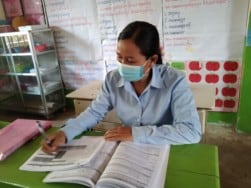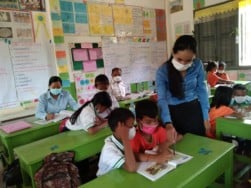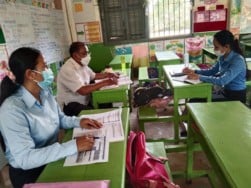School Director Demonstrates New Skills in Supporting and Coaching Teachers
July 5th, 2022 | Stories
A school director conducts a rapid test on reading syllables and phrases to assess a student’s reading level.
One role of a school director is to observe teachers and provide instructional support. World Education and Cambodian organization Bandos Komar are strengthening the capacity of school directors to support their early grade teachers throughout the roll out of the government’s new learning package in the 2021–2022 school year.

A school director uses the observation form and grade 2 teacher’s guide to perform a teacher observation.
Through the Food For Education (FFE) project, World Education and Bandos Komar are holding training workshops to equip school directors with the skills and tools they need to ensure their teachers are correctly using the new learning package, teaching methods, and materials.
School directors learn about techniques such as the “I do, we do, you do” approach, where the teacher demonstrates a task, the teacher and students do it together, and then the students do it independently. School directors also learn about the materials used in the new learning package, like a teacher’s guide that provides steps and time frames for lessons, student supplementary books, and engaging students, checking for understanding, and offering support to students who are struggling.

A school director and a coach observe a teacher demonstrate new skills and approaches for teaching the learning package.
Ms. Tola is a school director for a primary school in Kampong Chhnang. Prior to becoming a school director, she worked as a primary school teacher for 14 years. In December 2021, Ms. Tola attended a two-day training organized by World Education during which she received instruction on how to properly observe and support her grade 2 teachers in their use of the new teaching techniques.
Since the training, Ms. Tola regularly observes her teachers. Not only does she use the new skills she learned, like how to use the teacher observation form and provide constructive feedback, she also feels more confident in her ability to support her teachers.
I am so glad that I can use these new skills and tools to help my teachers. If I can coach and support them, I think they will be able to teach the new material more effectively. Better teaching helps our students learn and read better,” she explained.
In the training workshop, Ms. Tola also learned how to conduct assessments with students to check their understanding of the material. After observing the grade 2 literacy lesson, Ms. Tola conducted a rapid test with four randomly selected students. She took them aside and asked them to read the syllables or phrases on the test sheet. This simple exercise provides a quick and easy assessment of each student’s reading ability.
Conducting the rapid test with students at the end of session was great,” Ms. Tola said. “The teacher and I have discussed the results and we have identified ways to help struggling students,” she added.

A school director and a coach give feedback to a grade 2 teacher.
When she had observed the lesson and conducted the rapid test with students, Ms. Tola was finally prepared to provide feedback to her grade 2 teacher on the lesson facilitation and student assessment results. Thanks to the training workshop Ms. Tola attended, she was able to identify ways the teacher could improve her instruction, like using more game activities to engage students.
I am proud that I can support my teachers and help them improve. My support not only helps the teachers, but the students as well. The more they are engaged in the sessions, the more their reading will improve,” Ms. Tola explained.
The Food For Education (FFE) project through the World Food Programme is funded by the USDA.
World Education fosters enduring partnerships across regions and sectors to advance education outcomes for all. We offer education systems strengthening, program design and implementation, applied research and evaluation, capacity development, and policy development services.